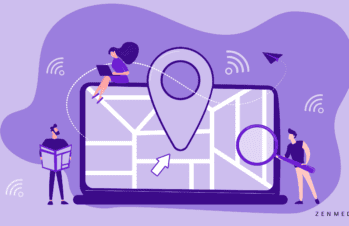Facebook’s just-unveiled Facebook Shops could be a game-changer for small businesses.
The social network’s venture into ecommerce has reportedly been in the works for a while, but of course, there’s no time like a pandemic to release a new virtual shopping experience.
From small businesses just venturing into ecommerce, to established ecommerce brands, Facebook Shops stands to make online shopping even more ubiquitous than it already was.
And before you think of Facebook Shops as just another Amazon, consider this: Shops is designed first and foremost to help you shop, not just purchase. Where Amazon can give you a cheap deal on that gadget you’ve been looking for, Shops can help you discover new brands, explore related products, and browse in a curated, virtual space.
So whether you’re a solopreneur, a small business, or an established brand, here’s what Facebook Shops could mean for you.
Shops’ position in the post-COVID ecosystem
It’s impossible to discuss ecommerce and business without discussing how those things are changing in light of COVID-19.
Although states are reopening and customers are beginning to go back into restaurants and retail stores, most experts agree that the pandemic has likely changed our economy for good.
The physical retail model, for instance, has always been designed to keep customers in stores as long as possible, looking at—and often touching—as many items as possible to encourage them to buy.
In the post-pandemic world, this model no longer works.
Instead, up to 75 percent of customers are preferring curbside delivery, and brands have responded by hopping on the curbside bandwagon in order to keep some of the sales that have been lost. But purchasing items online, and picking them up at the store—which has been happening for years, though more often within the actual store—entails a different sort of retail behavior, and one that is in many ways less conducive to impulse buys and browsing than being physically in-store.
In addition to offering curbside delivery and pickup, many retailers are retooling their displays to do the opposite of what they used to: keep people moving, establish distance between employees and customers, and make customer-employee interactions as few as possible.
Ecommerce is up in many areas, specifically “essential” items and home goods, and down in areas like apparel, luxury items, and travel products. People’s buying behavior is changing—and Shops is coming out at the perfect time to help businesses take advantage of that.
How Shops works
Shops allows Facebook users to set up one single online shop that is accessible on both Facebook and Instagram—for free.
Users can add products to their stores, customize their Facebook store with colors and fonts, and use Messenger, WhatsApp, and Instagram Direct to chat with customers. The idea is to recreate the in-person shopping experience as much as possible, so interaction with sellers is an integral part of Facebook Shops.
Customers can browse, select, and purchase products within Facebook or Instagram, if the seller has enabled checkout within the platform, or be taken directly to the seller’s website to complete checkout there. This makes the online shopping experience seamless, easy, and quick—three critical components of succeeding in the ecommerce space.
In fact, Facebook reports that in the future, users will be able to view a shop and make purchases directly within a WhatsApp, Messenger, or Instagram chat.
You can see which direction things are going: toward greater and greater convergence. Already, Facebook is trying to make it unnecessary to leave their platform in order to make a purchase, or even to leave the chat you’re engaged in to browse a few products.
Why your business should set up a Facebook Shop
One of the primary attractions of Facebook Shops, in addition to making the purchasing process seamless for users, is that it’s mobile-first.
Mobile has long been a challenge for retailers, as product information and shopping carts don’t always display well on smaller screens. It’s taken time for retailers to catch up to mobile browsing, which is one reason that so many have turned to mobile-friendly platforms like Shopify and Instagram.
Facebook Shops is launching specifically as a mobile-first shopping experience, making it much easier for retailers to sell to consumers through their phones or tablets—which is what a huge percentage of consumers are already doing.
In 2018, for example, over a third of ecommerce purchases during the busy holiday season were made on a mobile device, and as of January 2020, 79 percent of smartphone users had made a purchase from their smartphone in the last six months. While we don’t have numbers on mobile shopping during the pandemic months, based on anecdotal evidence and personal experience, it’s safe to say that mobile shopping has only increased.
FB Shops lets you make that mobile shopping experience, which is a challenge to recreate on your own website, immediately accessible for users, while also reaching a new group of potential customers: Facebook users who may like your page and view your posts now and then, but who aren’t motivated enough to leave the platform and browse products on your website.
Another huge reason to set up a Facebook store? Personalization.
We all know that Facebook is king when it comes to collecting user data. Any brand that’s used Facebook Ads knows how sharply targeted those ads can be—by geography, age, interests, gender, activity, and the list goes on.
So if a small business, for example, sets up a Facebook Shop, the owner can then create Facebook ads with offers that bring users to the shop to make a purchase.
What’s more, the ad and offer can be targeted specifically to the exact kind of people who are most likely to take advantage of the offer and make a purchase—and potentially become repeat customers.
The kicker, though, is that Facebook’s algorithm can target likely customers even without your hyper-personalized ad targeting.
Take a niche product like customized pet beds.
If a user posts pictures of his or her pet regularly, or shares news about animal shelters, or likes or clicks on posts featuring cute pets, then Facebook’s algorithm is going to target them as someone who’d probably like your product.
In an economy devastated by the coronavirus, these kinds of developments could become a lifeline for businesses that need to find additional sources of revenue—and quickly.
Facebook Shops is just one of the ways that businesses can adapt to meet the changing needs of customers, but it’s an important one. Need help with your Facebook Shop and reaching the customers who want you to find them? Contact us—we’d love to be your partner.




